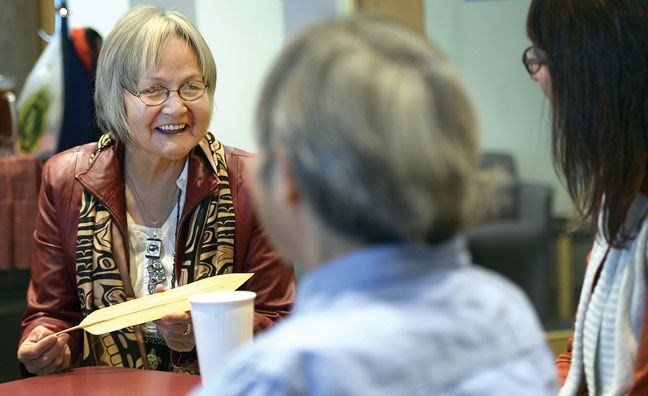Edie Frederick smiled softly and simply said: "Oh."
She wasn't surprised by the question, but so moved that the words took a few moments to form.
What does it mean to be University of Northern B.C.'s first elder in residence?
"It's a really great honour," she started.
"I get to teach about Lheidli and the history and the language and the land. I get to teach everything about Lheidli; and that's not written in books. There's nothing on Lheidli that's in textbooks so I get to teach this groundbreaking lesson and it's a great honour for me to do that."
Frederick is a familiar face on the hill. She helped husband Robert Frederick, who shared the elder in residence position with her, develop a dugout canoe class on campus.
Even as the two taught the technical skills of the craft, they also imparted cultural history.
"My part was the language," said Frederick, who speaks the Dakleh and typically starts students on the 46 letters of the alphabet, six of which are vowels.
"Pronunciation is very important," she said.
UNBC's First Nations Centre has already received so much positive feedback about creating an elder position, said Beverly Isaac, its interim assistant director.
It's important "on so many levels" to students.
"It is identity, connection to community, culture, tradition," Isaac said. "A lot of students are coming from small northern communities.
"That connection to home is going to be important for students who are feeling homesick who are missing talking to elders, having that guidance."
"It's that missing link almost."
The position was created out of successful funding request through the Aboriginal Service Plan program, and means UNBC can bring in one elder a month to stay for one week.
Frederick agreed that the position is symbolic, and she is touched by the gesture.
"It really hits close to home and finally, finally people are going to know who we are," said Frederick, whose brother-in-law is Chief Dominic Frederick.
The renaming of Lheidli T'enneh Memorial Park from its former title as Fort George Park, was also a big moment for the band.
"It really resonated with a lot of people. A lot of the people out there really didn't know the history," she said, but it was still tough to see some of the online comments.
"People generally in Prince George they're very respectable and they really don't say anything really bad right to my face," she said. "It's just on Facebook where I can't talk to them face to face.
"It's out of ignorance. They don't know the history," said Frederick, in reference to the forced removal of her people from much of the land that comprises downtown Prince George. Just over 100 years before, the village burned to the ground.
It was important a Lheidli T'enneh member be the first elder, Isaac said, that the centre respect the traditional territory where the university stands.
And choosing the right person is similarly symbolic.
"Elders are not just elders because of age. It's because they walk the talk. They are respected in their community and their community identifies them as elders," said Isaac, adding they can provide important knowledge, guidance and mentorship.
"Edie and Robert were the perfect choice," she said.
"They have the knowledge, they carry on tradition and culture and they're respected as such."



